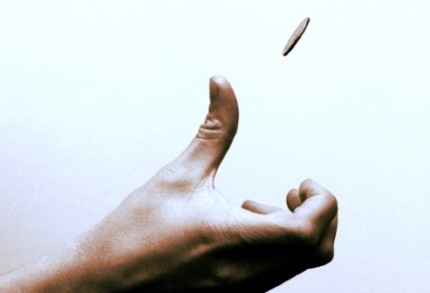In the New Year, toss a coin or trust Dr. Oz for medical advice?
—
Half of Dr. Oz’s medical advice is baseless or wrong, study says (Washington Post):
“…And now, his work has come under even greater scrutiny in the British Medical Journal, which on Wednesday published a study analyzing Oz’s claims along with those made on another medical talk show. What they found wasn’t reassuring. The researchers, led by Christina Korownyk of the University of Alberta, charged medical research either didn’t substantiate — or flat out contradicted — more than half of Oz’s recommendations…They selected 40 episodes from last year, identifying 479 separate medical recommendations. After paging through the relevant medical research, they found evidence only supported 46 percent of his recommendations, contradicted 15 percent and wasn’t available for 39 percent.”
Study: Televised medical talk shows—what they recommend and the evidence to support their recommendations: a prospective observational study (British Medical Journal). From the abstract:
- Objective: To determine the quality of health recommendations and claims made on popular medical talk shows.
- Sources: Internationally syndicated medical television talk shows that air daily (The Dr Oz Show and The Doctors).
- Interventions: Investigators randomly selected 40 episodes of each of The Dr Oz Show and The Doctors from early 2013 and identified and evaluated all recommendations made on each program. A group of experienced evidence reviewers independently searched for, and evaluated as a team, evidence to support 80 randomly selected recommendations from each show.
- Results: We could find at least a case study or better evidence to support 54% (95% confidence interval 47% to 62%) of the 160 recommendations (80 from each show). For recommendations in The Dr Oz Show, evidence supported 46%, contradicted 15%, and was not found for 39%. For recommendations in The Doctors, evidence supported 63%, contradicted 14%, and was not found for 24%. Believable or somewhat believable evidence supported 33% of the recommendations on The Dr Oz Show and 53% on The Doctors. On average, The Dr Oz Show had 12 recommendations per episode and The Doctors 11. The most common recommendation category on The Dr Oz Show was dietary advice (39%) and on The Doctors was to consult a healthcare provider (18%). A specific benefit was described for 43% and 41% of the recommendations made on the shows respectively. The magnitude of benefit was described for 17% of the recommendations on The Dr Oz Show and 11% on The Doctors. Disclosure of potential conflicts of interest accompanied 0.4% of recommendations.
- Conclusions: Recommendations made on medical talk shows often lack adequate information on specific benefits or the magnitude of the effects of these benefits. Approximately half of the recommendations have either no evidence or are contradicted by the best available evidence. Potential conflicts of interest are rarely addressed. The public should be skeptical about recommendations made on medical talk shows.



